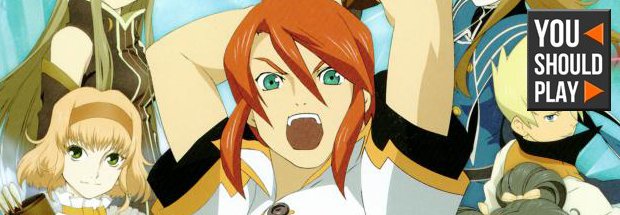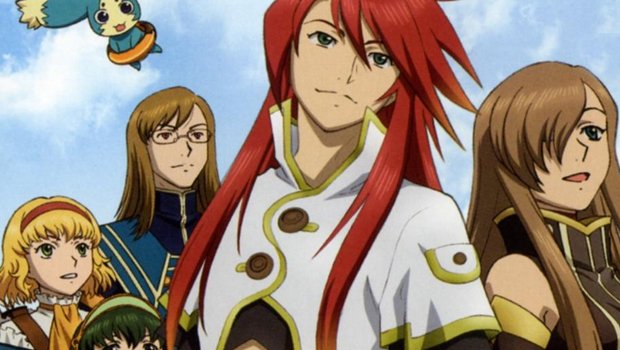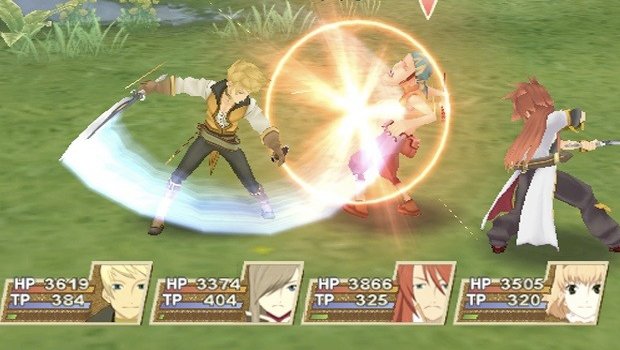Want to grow closer to three other friends? Play Tales of The Abyss!
Beating the norm by ascribing to it.

I’ll start by saying this: in that What type of Gamer are you article that just went up on Friday, I specifically requested to write the RPG gamer section. That entry came from the heart, and was definitely more than a little autobiographical. RPG’s are the reason I got into video games. I think many gamers can relate to this story: I was a quiet kid growing up, felt more comfortable talking to adults, let my sibling be the mouthpiece for both of us. I also loved books, and was mainly into science fiction and fantasy. They let me escape my shell and fall into totally new worlds for hours at a time.
And then I discovered RPG’s and went crazy. Not only could I dive into these other worlds, but I could actually vicariously be this awesome, powerful warrior who saves them. And I had friends! JRPG’s made up my childhood because of their insistence on giant casts of characters. I had an entire party of allies who were specifically engineered to love and grow with me, and in turn that made me feel loved and let me grow.

Enter Tales of the Abyss. Here’s what I love about all the Tales of games: they know exactly what they’re doing the entire time. This is why I would highly recommend this game to non-JRPG gamers and even non RPG gamer. They set up the first half of their games to be as straight a play on tried-and-tired archetypes and themes, and then spend the rest of the game absolutely destroying them. The Gamecube game Tales of Symphonia is a commentary on the selfless hero (and a fascinating dissection of Final Fantasy 10), but Tales of Abyss is all about the idea of a nemesis.
How it works is the game gives you six good guys. These six protagonists each have their own play style, their own personality, and--most importantly--their own enemy that is on the opposite side of the battle. Six good guys, six bad guys, six joint back stories that you don’t know about going into the game. You just know who to root for.
And that’s where Tales of Abyss crushes you and says “you were wrong to assume everything is so black and white. You’ve played shoddily-written JRPG’s like a lazy pig and now you’re going to hate yourself for hating these characters”, and one by one they force you to see the pain in these antagonists. They aren’t bad people, they are just everything the main characters can’t deal with. The banished father, the abandoned sister, the reject, the honor bound, the student. All of them at some point shake the main character and ask them, “do you know what you’re fighting for? How about me? Do you know why I’m doing this?” And the answer is always tragic. Sometimes your main characters aren’t even in the right, but unlike you they blunder forward because they feel they’re infallible. Crushing. Amazing, play it just for that.

Buuuuuuut if that doesn’t sway you, then the fact that this game is a FOUR PLAYER REAL-TIME CO-OP game should. There are healers, tanks, dps’, mages, and every role must be performed well to succeed. It takes real team work, and I haven’t felt that in a game since. I’ve played Abyss three times now, every time with different people, and every time it’s a different experience. You’d be surprised who your friends latch onto, or who you now hate because another friends brings perspective you never thought of before. Here is where Abyss is a traditional JRPG: it takes a good 60-80 hours to beat. So here’s what you do: you take three friends, make a pact to beat it together, try to play 8-10 hours a week, and in three months you’ll know more about them than you ever would have. The three people I played Abyss with are now among my closest friends, that’s how powerful I feel this experience is. So play it, and be glad you did.
Want to be the captain of your own starship? Play FTL!
Looking for stuff to play outside of the stuff we already tell you to play on a daily basis? You're in luck! Every Saturday we'll recommend an older game for you to check out, complete with a story on how we found the game and why we recommend you play it.
Weekly digests, tales from the communities you love, and more
Zach was once an Associate Editor for Future, but has since moved into games development. He's worked at EA and Sledgehammer Games, but is now Narrative Director on League of Legends and Valorant at Riot Games.


